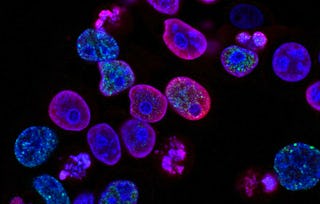What promise do stem cells hold for the treatment of medical conditions? In this five-part online course you will explore the history and basic biology of stem cells, learn about new research techniques, and find out how stem cells could lead to cures for diseases and to individualized medicine. You will hear from Museum scientists, medical researchers at the frontiers of the field, and a panel of bioethics experts who will address the ethical implications of stem cell research and therapy. Learn what has already been accomplished, what challenges remain, and what medical breakthroughs may lie ahead.

The Science of Stem Cells

3,206 reviews
Skills you'll gain
Details to know

Add to your LinkedIn profile
10 assignments
See how employees at top companies are mastering in-demand skills

There are 5 modules in this course
Welcome to The Science of Stem Cells! You will begin with a basic overview of stem cells--what they are, the history of stem cell research, and the potential for stem cell therapies. You will also learn from AMNH biologist Julia Zichello that stem cells are found throughout the tree of life.
What's included
6 videos3 readings2 assignments
This week, New York University’s Dr. Esteban Mazzoni will discuss how scientists can coax stem cells to differentiate into particular cell types. Dr. Mazzoni will also talk about new stem cell-assisted technologies such as mitochondrial replacement therapy and generating chimeras for organ transplantation. You will also get some background information on the science and ethics of cloning.
What's included
3 videos1 reading2 assignments
We have covered the process by which scientists can differentiate cells in a culture dish. Now you will look at how scientists can use these cell to model diseases in a culture dish. Dr. Andrew Sproul from Columbia University explains how cultured cells can be used to understand the cause of diseases and to look for drugs that will potentially cure them. His research is on Alzheimer’s disease. You will also explore how how stem cells have the potential to help with the study of diabetes.
What's included
3 videos1 reading2 assignments
In addition to the great potential of stem cells to be used in the study of disease, stem cells can also be used to actually treat disease. Neural stem cell pioneer Dr. Sally Temple will explain the potential for using stem cells in our own bodies (adult stem cells) to treat age-related macular degeneration, an increasingly common and debilitating disease. Dr. Temple will also give you some tools for evaluating potential stem cell treatments.
What's included
3 videos1 reading2 assignments
To complete the course, a panel of bioethics experts will discuss some of the controversies surrounding human embryonic stem cells and the legal, policy, and ethical challenges associated with the use of stem cells in basic and clinical research. You will have an opportunity to discuss and ask questions about the future of reproductive technology and stem cell research.
What's included
3 videos2 assignments
Instructor

Offered by
Explore more from Basic Science
 Status: Free Trial
Status: Free TrialUniversity of Colorado Boulder
 Status: Free Trial
Status: Free TrialUniversity of Colorado Boulder
 Status: Free Trial
Status: Free TrialUniversity of Colorado Boulder
 Status: Preview
Status: PreviewAmerican Museum of Natural History
Why people choose Coursera for their career

Felipe M.

Jennifer J.

Larry W.

Chaitanya A.
Learner reviews
- 5 stars
77.66%
- 4 stars
19.80%
- 3 stars
2.02%
- 2 stars
0.34%
- 1 star
0.15%
Showing 3 of 3206
Reviewed on May 6, 2020
The course is really good, informative. Can understand easily. Interesting. Have information of research process, expected results, application. And ethical issues are well explained
Reviewed on Apr 19, 2020
I would like to thank the Course coordinators and tutors for the lucid update and details of Stem cells. It has been a great time relearning the basics to the latest regarding stem cells.
Reviewed on Dec 26, 2020
Very informative, relevant and helpful lessons on Stem Cells. I have learned a lot and I'm excited to expound my knowledge on the science of stem cells and their future applications in medicine.

Open new doors with Coursera Plus
Unlimited access to 10,000+ world-class courses, hands-on projects, and job-ready certificate programs - all included in your subscription
Advance your career with an online degree
Earn a degree from world-class universities - 100% online
Join over 3,400 global companies that choose Coursera for Business
Upskill your employees to excel in the digital economy
Frequently asked questions
To access the course materials, assignments and to earn a Certificate, you will need to purchase the Certificate experience when you enroll in a course. You can try a Free Trial instead, or apply for Financial Aid. The course may offer 'Full Course, No Certificate' instead. This option lets you see all course materials, submit required assessments, and get a final grade. This also means that you will not be able to purchase a Certificate experience.
When you purchase a Certificate you get access to all course materials, including graded assignments. Upon completing the course, your electronic Certificate will be added to your Accomplishments page - from there, you can print your Certificate or add it to your LinkedIn profile.
Yes. In select learning programs, you can apply for financial aid or a scholarship if you can’t afford the enrollment fee. If fin aid or scholarship is available for your learning program selection, you’ll find a link to apply on the description page.
More questions
Financial aid available,

